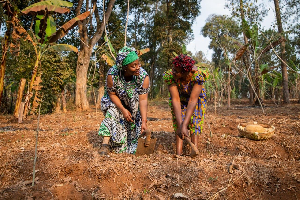Each of these children owes GHC3,512.81 even though they played no role in contracting government loans.
Every Ghanaian owes about GHC3,512.81 in government debt, population projections made by the Ghana Statistical Service (GSS) as at end 2015 suggest.
According to the Bank of Ghana (BoG), Ghana’s debt stock rose to GHC97.2 billion ($25.6billion) in December 2015, equivalent to 72.9 percent of GDP.
Out of this, total external debt amounted to GHC57.8 billion, 43.4 percent of GDP and domestic debt was GHC39.4 billion (29.5 percent of GDP).
According to Eric Kofi Kontoh, an economist and analyst, who recently commented on the implications of the total national debt for every citizen in a recent analysis, government added GHC73 billion between 2011 and 2015, representing an average growth rate of 75 percent per year to the public debt.
“As the debt continues to go high, the liability of every Ghanaian is also rising…Within the last four years, Ghana’s total debt stock rose to GHC97.2 billion (72.9 percent of GDP) as of 2015, up from GHC24 billion (42.2 percent of GDP) as at the end of 2011.”
He referred to a recent study published by the International Monetary Fund (IMF) which said the level of the debt was not much of a concern but the growth of the government debt posed long-run negative consequences on economic growth in his analysis.
He said the IMF study found that debt thresholds for developing countries such as Ghana ranged from 30 percent to 60 percent, adding that those of advanced economies ranged from 60 percent to 80 percent.
Total revenue and grants as a percentage of GDP as at the end of 2015 were estimated at 23.3 percent compared to total debt-to-GDP ratio of 72.9 percent.
The 2016 Budget statement estimates total interest payment at GHC10.5 billion, equivalent to 6.6 percent of GDP.
The interest payment as a percentage of GDP was 2.8 percent as at 2009, 4.3 percent as at 2014 compared to 6.6 percent budgeted for in 2016.
Furthermore, the economist cited Fitch’s Ratings (2015), which depicts Ghana’s interest payment burden as highest amongst its rated sub-Saharan Africans sovereigns, adding that interest payments consumed almost one-third of government revenues.
Mr Kontoh explained that the amount budgeted by government for interest payment in the 2016 budget was higher than funds allocated to government units; comprising statutory payments into the National Health Insurance Fund, Ghana Education Trust Fund, District Assemblies Common Fund, Road Fund, Petroleum-Related Funds, transfer to the Ghana National Petroleum Company and retention of internally-generated funds by MDAs estimated at GHC9.7 billion.
Moreover, he indicated that the budgeted interest payments for 2016 was higher than the total amount of GHC6.7 billion allocated for capital expenditure in the country.
“It is also higher than the expected tax proceeds from domestic goods and services estimated at GHC7.4 billion.”
Business News of Tuesday, 5 April 2016
Source: dailyguideafrica.com













